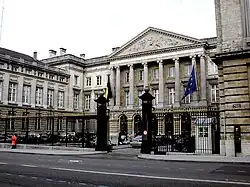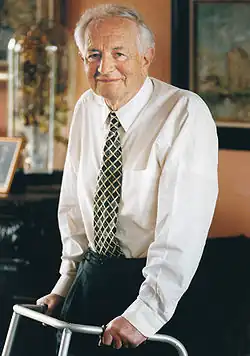Cultural Council for the Dutch Cultural Community
The Cultural Council for the Dutch Cultural Community was the predecessor of the Flemish Parliament from 1971 to 1980. It was established by the constitutional amendment of 24 December 1970. On 1 October 1980, its powers were taken over by the Flemish Parliament.

The 1970 Belgian Constitution established the Dutch Cultural Community, alongside the French and German Cultural Communities, which were given their own powers in the areas of language and culture, and to a very limited extent, education.
The Cultural Council for the Dutch Cultural Community, sometimes simply called the "Culture Council," was not directly elected but was composed of the Dutch-speaking Members of Parliament and Senators.
The Cultural Council was based in Brussels. This was not straightforward: most members wanted to claim Brussels as their capital on principle, or opted for its proximity to the national parliament and government for practical reasons. The Volksunie, on the other hand, wanted to distance itself from national politics and supported the candidacy of Mechelen.[1]
All plenary meetings of the Cultural Council were therefore held in the hemicycle of the House of Representatives. The Cultural Council also used the Chamber's committee rooms and infrastructure for its committee meetings.
The cultural communities were assigned their own minister, who remained part of the national government, the Minister of Dutch Culture, just as there was also a Minister of French Culture within the same government.
Powers
Legislative Power
The Cultural Council had four major areas of responsibility:
- Cultural Affairs
- Use of Languages
- Education
- International Cultural Affairs
Executive Power
In the 1970s, the Cultural Council did not yet have the right to appoint its own government. As a result, only ministers from the national government appeared before the Council.
The ministers regularly summoned by the Council were:
- Ministers of Dutch Culture
- Ministers of National Education, responsible for the Dutch-speaking part of the country.
Composition
On Tuesday, December 7, 1971, the Cultural Council met for the first time in the Chamber of Representatives. It was composed of the directly elected Members of Parliament and Senators of the provinces of Antwerp, Limburg, East and West Flanders and the administrative districts of Leuven and Halle-Vilvoorde, the provincial senators of the provinces of Antwerp, Limburg, East and West Flanders, and the directly elected Members of Parliament and Senators of the bilingual district of Brussels, the provincial senators of the province of Brabant, and co-opted senators, provided that these three categories had first taken the oath in Dutch in the Chamber or Senate.
On December 7, 1971, the Cultural Council consisted of 213 members. After the 1974 parliamentary elections, that number rose to 221, and after the 1977 and 1978 elections, the Cultural Council also had 221 members.
| Party | 1971-1974 | 1974-1977 | 1977-1978 | 1979-1980 | |
|---|---|---|---|---|---|
| CVP | 89 | 98 | 105 | 108 | |
| BSP | 52 | 48 | 47 | 47 | |
| PVV | 31 | 36 | 31 | 39 | |
| Volksunie | 40 | 38 | 37 | 25 | |
| KPB | 1 | 1 | 1 | 1 | |
| Vlaams Blok | - | - | - | 1 | |
Chairpersons
The inaugural meeting of the Cultural Council was chaired by the council's oldest member, Leo Elaut, senator for the Volksunie. At the same meeting, Robert Vandekerckhove, senator for the Christian People's Party (Belgium) CVP, was elected the first chairman.
The following is the text. A list of chairmen of the Cultural Council.

| No. | Name | Party | Start | End | |
|---|---|---|---|---|---|
| 1 | Robert Vandekerckhove | CVP | December 7 1971 | May 9 1974 | |
| 2 | Jan Bascour | PVV | May 9 1974 | June 14 1977 | |
| 3 | Maurits Coppieters | VU | June 14 1977 | April 24 1979 | |
| 4 | Henri Boel | BSP | April 24 1979 | December 22 1981 | |
Image problem
The Cultural Council for the Dutch Cultural Community struggled with an image problem during the 1970s. Few Flemish people were familiar with the Council, and even fewer understood the function of the Dutch cultural parliament. From 1978 onwards, the Council attempted to increase its name recognition among the general public by organizing a July 11 celebration.
References
- ^ Parliamentary Proceedings 07.03.1972